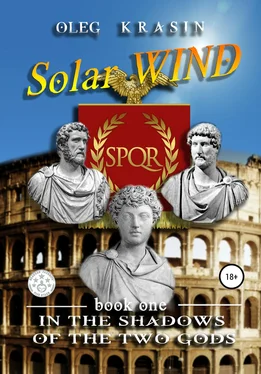Probably, they show me one of the philosophical tricks, decided Marcus, if you want to get someone else's attention, you have to be different, stand out from the crowd anything. Even if it will be due to a vile smell.
“There is a constant stoic exercise,” Apollonius continued, “it is to decompose things into pieces and then the essence becomes clear. Take, for example, a piece of pork. You think it's a great meal, but it's just an animal's corpse. Or the toga that's on your body right now. If you look at what it's made of, you'll see that it's actually the hair of the sheep that made the yarn. Good wine, delighting our taste, came from grape slurry. Or what many men aspire to—I'm talking about owning a woman. This is just the friction of the insides with the release of mucus. And it is accompanied by convulsions, the cause of which is unclear to us. So, we can conclude that behind the external brilliance is always hidden plainness, unsightly nudity.”
Marcus curiously listened to the reasoning of the stoic.
Indeed, the mind easily, effortlessly comprehended what was on the surface. But what lurked in the depths? Apollonius gave the key to comprehension by decomposing phenomena into components, studying them separately, and then coming closer to a true understanding of the essence of things.
The only thing that was hard to break down into particles was space. It was, as the Stoics were taught, the elementary fire, the source of the world's mind, and the mind was indivisible. The abyss of space. The Logos. Perhaps he could be interested in it, but Marcus was much more interested in studying man, because man hides in his soul something dark and unexplored, beastly. And it seemed to Marcus that the abyss itself was not a cosmos, it was separated from it, for the cosmos did not include a bottomless emptiness, because it was filled with reason. The abyss was a man with his hidden passions and vices, which led to madness.
Конец ознакомительного фрагмента.
Текст предоставлен ООО «ЛитРес».
Прочитайте эту книгу целиком, на ЛитРес.
Безопасно оплатить книгу можно банковской картой Visa, MasterCard, Maestro, со счета мобильного телефона, с платежного терминала, в салоне МТС или Связной, через PayPal, WebMoney, Яндекс.Деньги, QIWI Кошелек, бонусными картами или другим удобным Вам способом.
Plato is an ancient Greek philosopher who lived in the IV-III century B.C.
Guy Petronius Arbiter (14-66) is a Roman writer, author of the satirical novel «Satyricon».
Publius Aelius Trajan Hadrian (76-138) was a Roman emperor in 138.
Logos (from Greek «word», «thought») – the World mind.
Marcus Ulpius Nerva Trajan (53-117) was a Roman emperor in 117. Adopted the future emperor Adriana under the influence of his wife Pompey Dam.
Apollodorus of Damascus (d. 129) is an architect of the Roman Emperor Trajan's era.
Vibia Sabina (85-137) was the wife of Emperor Adrian.
Antinous (111-130) is a lover and constant companion of the Roman Emperor Adriana, deified after death.
Ra is the Egyptian god of the sun.
Toga is the outerwear worn by men in ancient Rome
Salire (Latin) – jumping, dancing.
Frumentarii (Latin) were individuals who ran public bread shops and collected different information for the emperor.
Verissimus (Latin) is the truest, true.
Annius "Annales,” book 1., (translated by S.A. Osherov), Chrystomatia on early Roman literature, Moscow, 2nd edition, publishing house "Greek-Latin Cabinet of J.A. Shichalina," 2000, p.35
Genius is the spirit of the patron saint of men.
During the burial of the Roman emperors in the sky released an eagle, considered a bird of Jupiter.
Marcus Porсius Cato the Elder (234-149 BC) is a well-known Roman politician and writer.
Stola (Latin) – in the ancient Romans women's clothing in the form of tunics, which was worn on top of the bottom tunics and reached the ankles. The stola was a symbol of a legal marriage, and was the clothes worn by the family Romans.
I'm a Roman citizen! (Latin)
Citharode was a classical Greek professional performer (singer) of the cithara.
Cynic (from the Greek dog) is one of the Greek philosophical schools, followers of Socrates, who preached simplicity, escape from conventions.
Parks are the Roman goddesses of fate.
Celebrations in honor of Bacchus and Ceres on March 17. On this day, the young men wore toga virilis.
Toga virilis is a toga of maturity worn by the Romans when they came of age at the age of sixteen.
AD 134.
In ancient Greek mythology, the God of medicine and healing.
Sigma – a bed in the form of a Greek letter ∑.
Peristyle (Greek) garden, surrounded on four sides covered with colonnade.
Mucius Scaevola (Latin "Lefty") put his hand on the fire of the roaster to show Etruscan king Porsenna the courage of the Roman people.
Palanquin is a bed with curtains carried by slaves in their arms.
Domina (Latin) – Madam.
Baiae is a resort in ancient Rome.
Insula is a high-rise building in Rome.
Saturnalia is a holiday in honor of the god Saturn in December.
Parasite (Greek) is a slacker. In Rome, poor citizens entertained the hosts at the table.
The Nomenclator (Latin) is a slave or freedman who during the walk called the names of the oncoming people.
Libertas (Latin) – Freedom
It was believed that women also secreted seed.
Option (Latin Optio) is a centurion assistant.
Decurion (Latin Decurio) is the leader of the ten-man cavalry unit in the Legion.
Lupa (Latin) is a wolf, harlot
Fasces is a bundle of bandaged bars, symbolizing official power.
Simon Bar-Kohba was the leader of the Jewish uprising in AD 131-135.
The frumentarii, at first petty-officers connected with the conveyance of military dispatches. Many of them were then attached to the imperial service as a sort of secret police.
Читать дальше










